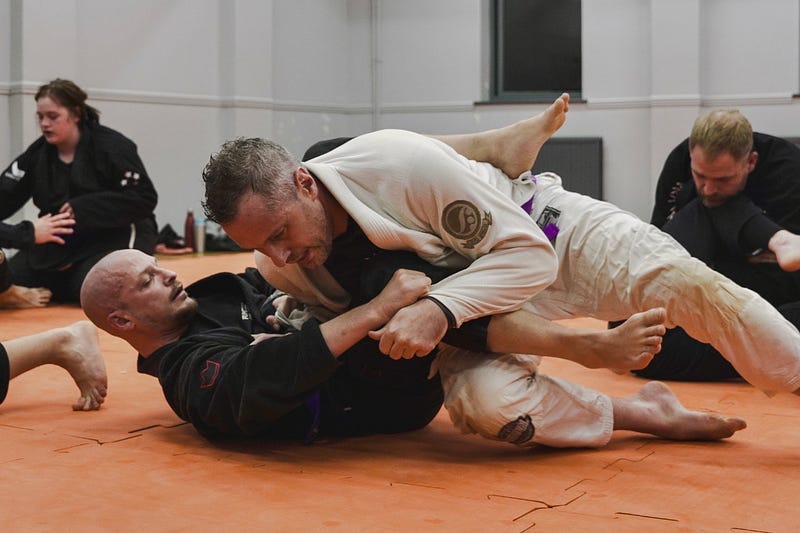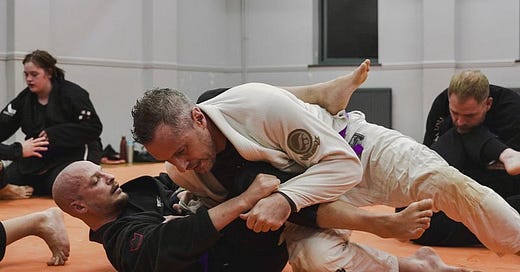Grappling with Growth: The Unlikely Parallels Between BJJ and Scaling a Business
The arm around my neck gets tighter, making my vision blur and little stars of light appear. My laughable attempt to overpower the much…

The arm around my neck gets tighter, making my vision blur and little stars of light appear. My laughable attempt to overpower the much bigger and stronger opponent has failed. I tap limply on the side of his arm. As his grip loosens, he smiles at me and asks, "You alright, Mike?".
I'm fine. The only pain I feel is my ego leaving my body – but I have become used to that over the years. He extends his hand – I slap it, then bump his fist. He comes at me again, and I know it won't be long until I am in a similar position, but hopefully, if I am smarter, I can hold out a bit longer this time.
Brazilian Jiu-Jitsu (BJJ) is a martial art that focuses on ground-based grappling. One of its defining features is the emphasis on live, full-resistance training that allows you to practise techniques dynamically without holding back – "rolling".
I started training in BJJ in 2019 at the same time as joining loveholidays – the fastest-growing private business in the UK – as CTO to help it scale. Since then, I have been in similar situations countless times whilst trying to professionalise a start-up. Even though the parallels between the two may seem obscure, the lessons I have learned desperately trying to improve at BJJ have been a continuing source of inspiration and insight into scaling a company.
Recently, I was unexpectedly promoted to a purple belt by my teacher, Chris Cleere – a black belt under Roger Gracie. Purple is the first of the advanced belts in BJJ and represents the halfway point to the ultimate goal – black. It happened the same week that loveholidays completed an incredible year – one where it has also started delivering at a very high level after years of investment.
The timing of these events gave me the impetus to reflect on how BJJ has helped me. The result is the five following lessons.
I: Win or Learn: Cultivating a Continuous Growth Mindset
BJJ shows learning is a continuous process. The structure of the classes ensures that you are always facing different types of challenges – experience level, body size, strength or speed. People also improve as you do, providing a training environment that constantly shifts. Developing a mindset that views this as an opportunity to grow becomes essential. As Chris often says, "You either win or you learn." Both are desirable outcomes, but you must put yourself in a position to make that possible.
This mindset was helpful this year when our CEO asked me to take responsibility for our contact centre. Given my technology background, it was quite a change and out of my comfort zone. Still, I grabbed the opportunity with both hands, keen to understand if my approach could translate and simultaneously develop a deeper business understanding. There were several wins, but the most impactful experience was meeting and learning about our outsourcing partners. It challenged my preconceived ideas, and their compassionate approach to employee care was motivational.
II: Guided Mastery: The Critical Role of Expert Mentorship
BJJ is hard. There is a vast range of techniques to learn – each with unique intricacies that take time to master. As a result, the classes are structured with each new skill first demonstrated by Chris before you practise applying it under his guidance. It's invaluable to learn this way. Having someone who has already trodden the path to show you what is crucial and the details that matter makes learning much quicker and helps avoid silly mistakes.
This approach shares much in common with deliberate practice – a concept popularised by psychologist Anders Ericsson, which I have integrated into my professional development. So when I decided to work on verbal communication this year, I used my learning budget to seek expert help. I was lucky to be introduced to Sarah Jane McKechnie from StorySpotters, a "black belt" in crafting and telling stories that engage people. Just like at BJJ, the experience of Sarah modelling how it should be done and having constant in-the-moment feedback was invaluable. It helped me learn valuable lessons about how to turn facts into a narrative.
III: Strategic Progression: From Reaction to Goal-Oriented Adaptation
Focusing on sparring means it's easy to fall into the trap of just reacting or only trying to win in the chaos of competition. However, you quickly learn that doing this will get you nowhere. To improve, you need to have a goal and a plan to address areas of weakness and integrate new skills you have learned. This way, each time you compete, the focus shifts from winning to improving – providing the opportunity to think and choose your reaction.
Similar to rolling, the travel sector is chaotic. There have been numerous industry-redefining events to deal with over the years, including volcanoes erupting, established brands collapsing and a global pandemic. We have been able to respond to these effectively whilst creating a scalable platform by having a destination in mind. This required us to invest time collaboratively in building a shared strategy and ensuring teams are structured to have the autonomy to respond. It meant that each initiative was delivered in a way that brought us closer to our vision.
IV: Cultivating Growth: The Influence of a Supportive Environment
Whilst martial arts may seem solely focused on personal improvement, your success and ability to improve are intrinsically linked to those around you. It's only possible to practise BJJ with others – therefore, the environment matters. From day one, Chris has focused on building a welcoming and supportive club culture for all levels, ages and backgrounds. He has achieved this by regularly highlighting the importance of expected behaviour and maintaining it by continually modelling it.
If you are going to scale, the standard of behaviour needs to be modelled from the top down. This includes being transparent about the standards you expect, holding people accountable, and, most importantly, applying the same standards to yourself. We did this very early on by defining the technology principles we believed would help us scale, clarifying expectations in career frameworks and measuring our impact. Sticking to them and not letting our standards drop, has led to several difficult conversations, but ensured we created a supportive and high-performing environment.
V: Grit and Growth: The Impact of Resilience when Scaling
There is nowhere to hide when you're rolling with your progress (or lack thereof) continually presented to you. If this teaches you anything, it's the importance of grit. The mental resilience to keep turning up and facing the challenges to meet your goal, regardless of how you feel. It helps you understand that "the line of progress is never straight" – that there will always be setbacks, but that's part of the process. Ultimately, committing to something through the temporary lows (and highs) will allow you to achieve unexpected results.
Mental resilience is a prerequisite for anyone wanting to scale a business. Over the years, there have been many ups and downs, frustrations, business challenges, complicated people issues and disagreements. BJJ has reinforced the determination that you just need to keep turning up and the realisation that "you're the surfer, not the wave". Also, jiu-jitsu turns the volume down on work problems, too – most things seem a lot less stressful when compared to nearly being choked unconscious.
Conclusion
I realise I have become a total BJJ bore and writing this will further reinforce that image. However, the lessons I learned are not about martial arts at all but a testament to the benefits of trying new things –how embracing new experiences can broaden outlooks, enrich perspectives, challenge thinking and introduce you to inspiring people.
This is great because it means you don't need the threat of being choked out to get the same benefits (but I would recommend it and know a great club if you're near Marlow).
Also, you shouldn't limit what you believe you're capable of or see it as a trade-off. When I look back, it was a strange decision to start a new role and a martial art simultaneously, but it was one of the best I have made. I have not only found the time to commit to the point of receiving a purple belt, but the experience has also helped improve how effective I am at work.
Therefore, I suggest that no matter what situation you find yourself in professionally, try something new.
Travel to a new country to learn about different cultures and ways of life. If you have always wanted to learn an instrument, take some lessons – it may help you relax and express yourself. If you have never volunteered your time, find something you are passionate about and get involved. The options are endless.
I have learned you never know how it will help you, but it will and in unexpected and exciting ways.



